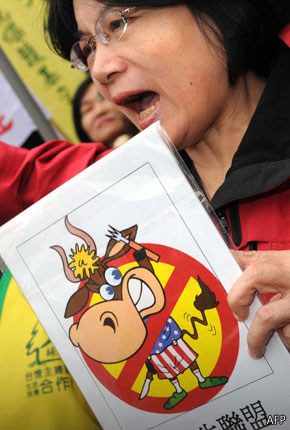Taiwan: Groups rally against TPP preparations

Taipei Times | 21 Jul 2015
Groups rally against TPP preparations
STRUCTURAL REFORM: The TPP is unusual among trade agreements, as it requires legal reforms on a national level, and not just lifting tariffs, activists said
By Sean Lin / Staff reporter
Members of Green Party Taiwan (GPT) and the Economic Democracy Union yesterday rallied in front of the Ministry of Economic Affairs building in Taipei to protest what they said was the government’s “black box” approach toward its logistics planning for negotiations in its bid to join the Trans-Pacific Partnership (TPP).
The demonstrators asked the ministry to publish the results of its survey on “difference in level of liberalization,” conducted at the behest of the Executive Yuan last year.
They said that the survey results contain key information on restrictions the nation would be subjected to if it joins the TPP.
Deputy Minister of Economic Affairs Bill Cho (卓士昭) last week “spilled the beans” about potential problems that could arise if Taiwan joins the TPP, protesters said, which include more than 50 discrepancies between TPP statutes and the nation’s laws, as well as a purported requirement that the nation must import pork from the US.
Cho said the ministry would deliberate over the viability of amending laws so that they would come into line with TPP statutes.
At present, only US pork that is free of leanness-enhancement agents may be imported.
GPT Secretary-General Hsu Po-jen (許博任) said the TPP is different from traditional international trade organizations in that it not only pertains to border controls that deal with levying tariffs, but also entails legal reforms at a national level.
He said that other controversies surrounding the TPP include a possible extension of the patents on pharmaceutical products, which has sparked concerns that the rule might hamper the production of generic drugs, as well as a gradual decrease in tariffs on imported agricultural products, which detractors said would severely impact the nation’s farming sector.
Also, there is a concern about the potentially negative effects of the TPP’s purported requirement that its member states open up state-run enterprises to foreign investors, Hsu said.
GPT co-convener Lee Ken-cheng (李根政) said that joining the TPP is a move that calls for a high level of civic participation, and the ministry should publish survey findings so that the issue can come under public scrutiny.
“I believe that after weighing the benefits and losses the TPP is estimated to bring, the public would not want to trade their freedom and livelihoods for the prosperity of powerful nations and large corporations,” he said.
Union convener Lai Chung-chiang (賴中強) said that the TPP might benefit some sectors, but that does not mean increased revenue would trickle down to ordinary workers.
He said that the TPP would likely interfere with pesticide residue standards in crops set by its member countries and take lawsuits filed by multinationals against local companies under its jurisdiction, thereby weakening a member state’s administrative power.
The TPP could have a more profound impact on Taiwan than the cross-strait service trade agreement signed with China, he said.
Bureau of Foreign Trade multilateral trade affairs division director Fang Wen-ying (房文英) denied that there had been any “black box” dealings by the ministry in its handling of the TPP survey.
She said that it would be premature to release survey results, as the TPP would announce its protocols following a negotiation between the 12 nations involved which are expected to conclude by the end of this month.





